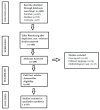Propolis and Diet Rich in Polyphenols as Cariostatic Agents Reducing Accumulation of Dental Plaque
- PMID: 35011503
- PMCID: PMC8746943
- DOI: 10.3390/molecules27010271
Propolis and Diet Rich in Polyphenols as Cariostatic Agents Reducing Accumulation of Dental Plaque
Abstract
Conducted studies indicate the relationship between oral health and systemic diseases. Moreover, the latest research indicated that cariogenic bacteria may severely influence the course of SARS-CoV-2 infection and increase risk of COVID-19 complications. This article aims to review various applications of propolis and pay attention to a healthy diet rich in polyphenols, which may allow the reduction of dental plaque accumulation. A literature review has been conducted from June until November 2021. It showed that propolis could be a useful agent in decreasing the accumulation of dental plaque. Moreover, a diet rich in polyphenols prevents cariogenic bacteria and reduces the accumulation of dental plaque. A reduction of a dental plaque may influence the risk of a severe course of COVID-19. Therefore, propolis and a diet rich in polyphenols may play an important role in prophylaxis of systemic diseases. Recently, it has been proven that oral infection may affect cardiovascular system, musculoskeletal system, respiratory system, nervous system, as well as may be a risk factor for diabetes mellitus. These aspects should stimulate clinicians to further research about polyphenols.
Keywords: SARS-CoV-2 infection; dental plaque; diet; polyphenols; propolis.
Conflict of interest statement
The authors declare no conflict of interest.
Figures
References
-
- Nazir M.A. Prevalence of periodontal disease, its association with systemic diseases and prevention. [(accessed on 16 October 2020)];Int. J. Health. Sci. 2017 11:72–80. Available online: https://www.ncbi.nlm.nih.gov/pmc/articles/PMC5426403/ - PMC - PubMed
Publication types
MeSH terms
Substances
LinkOut - more resources
Full Text Sources
Medical
Miscellaneous




